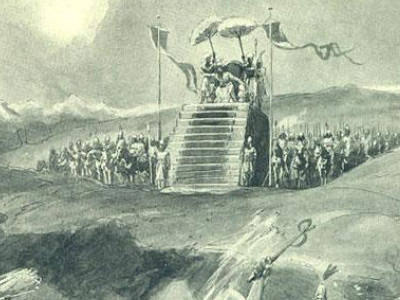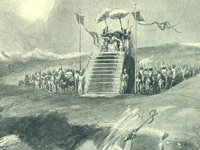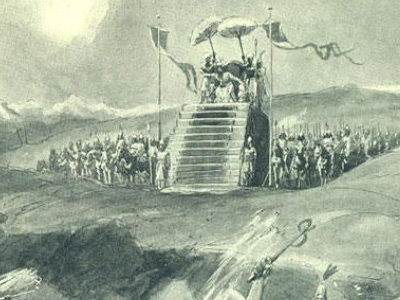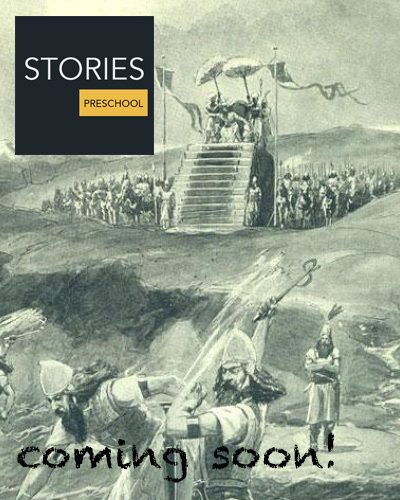Battle of Mycale (479 BC)

Prelude
When the Persians heard that the Allied fleet was approaching, they set sail from Samos towards the Ionian mainland. According to Herodotus, this was because they had decided in council that they could not beat the Allies in a naval battle. They sent the Phoenician ships away (Herodotus does not explain why), and then sailed to the shore near Mount Mycale. Xerxes had left an army there, under the command of Tigranes, to guard Ionia. The Persians beached their ships, built a palisade around them, and prepared to guard the makeshift fort.
Finding the Persian fleet gone from Samos, the Allies were thrown into uncertainty. Eventually they resolved that they would sail to the mainland, and equipped themselves for a naval battle. However, when the Allies approached Mycale, the Persians did not attempt to engage them, and remained guarding their camp. Leotychides therefore sailed as close to the camp as possible, and had a herald make an appeal to the Ionians:
"Men of Ionia, you who hear us, understand what I say, for by no means will the Persians understand anything I charge you with when we join battle; first of all it is right for each man to remember his freedom and next the battle-cry Hebe: and let him who hears me tell him who has not heard it."
Herodotus suggests that the purpose of this message was twofold; firstly to encourage the Ionians, unbeknownst to the Persians, to fight for the Allies (or at least not to fight against them); or, if the message became known to the Persians, to make the Persians mistrust the Ionians.
Following this appeal, the Allies also beached their ships, and began to prepare to assault the camp. The Persians, guessing that their Samian contingent would support the allies, took away their armour. Furthermore, they sent the Milesians to guard the passes over Mycale, suspecting that the Milesians might also defect. Thus rid of two potential internal threats, the Persians left their camp, and prepared for battle. It is probable that the relatively small number of marines that the Allies had disembarked for the battle made them overconfident, encouraging the Persians to leave the safety of their camp.
Herodotus reports that as the Allies approached the Persian camp, rumour spread amongst them of an Allied victory at Plataea; Diodorus also claims that Leotychides informed the Allies of victory at Plataea before the battle began. Their morale boosted by this omen, they set forth to win their own victory. Various explanations have been attempted to explain this occurrence, and also the alleged fact that Plataea and Mycale took place on the same day. Green suggests that following the victory at Plataea, the Allied commander Pausanias took control of the Persian beacon system that Xerxes had used to communicate with Asia, and used it to send tidings of Plataea to the Allied fleet. This would explain the rumour of victory and near simultaneous attack, but is only one possible theory.
HISTORY

RESOURCES
This article uses material from the Wikipedia article "Battle of Mycale (479 BC)", which is released under the Creative Commons Attribution-Share-Alike License 3.0.
© Stories Preschool. All Rights Reserved.









